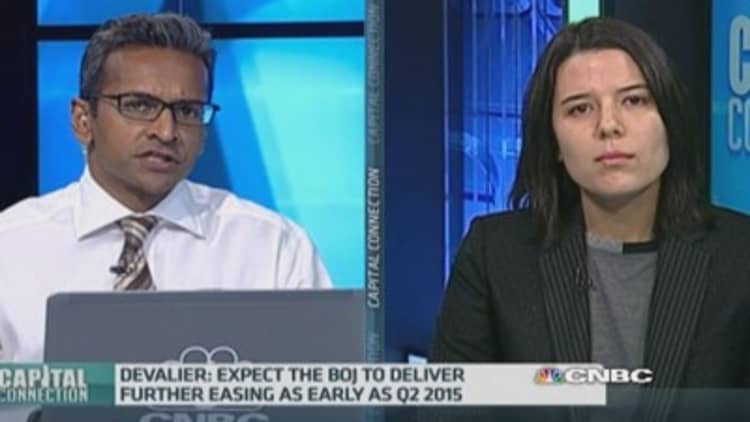
A slew of headlines from Japan flooded markets this week, increasing speculation that Prime Minister Shinzo Abe will pursue a second consumption tax hike, but experts say that Monday's preliminary growth figures remain crucial to his decision.
Gross domestic product (GDP) for the July-September quarter will be released before Tokyo's market open and is widely expected to be the critical factor in Abe's decision on whether to increase the consumption tax to 10 percent from 8 percent currently.
Economists surveyed by Reuters predict the world's third-largest economy expanded an annualized 2.1 percent, recovering from the previous quarter's 7.1 percent contraction - the biggest since 2009 due to the April consumption tax hike.
Read MoreJapan's Abe to postpone 2015 tax hike
HSBC forecasts for a 2 percent annualized rise, while Harumi Taguchi, principal economist at IHS Global Insight, expects a 2.5 percent rise.
"The risks are to the downside, I wouldn't be surprised if we saw a number printed below 1 percent. That would definitely underscore the weakness of the recovery," said HSBC economist Izumi Devalier.
The services sector accounts for roughly 70 percent of the domestic economy, so consumer-related data are crucial for a higher GDP figure. However, the picture remains gloomy. Annual real wages and household expenditure declined in each month during the past quarter. Meanwhile, consumer confidence has deteriorated since August, while the Economy Watchers survey, published by the government, has remained below the 50 level that denotes pessimism from optimism.
On Wednesday, economy minister Akira Amari said that the government should implement fresh fiscal stimulus to cushion the economy if Monday's GDP data disappoints, with special attention on stimulating private consumption.
What this means for the tax hike
Guesswork has been mounting all week that Abe will postpone the tax hike. On Tuesday, government officials told Reuters that Abe will delay the increase, while the Sankei newspaper on Wednesday indicated otherwise. On Thursday, Jiji news agency quoted senior LDP lawmaker Tadamori Oshima as saying that Abe appears to have decided to call an early election, suggesting that the tax will indeed be delayed.
Read MoreJapan snap election:a sign Abenomics is crumbling?
"There is certainly elevated noise at present but we should hear more next week after the Q3 GDP print. It seems more likely than not that Abe will return from his overseas tour on Monday and make an announcement early next week," said Chris Weston, chief market strategist at IG in a note.
Abe has stated that he intends to wait until quarterly GDP figures are released before making a decision, but HSBC's Devalier believes that Abe has already decided to delay the hike.
"All the economic data for the past quarter is already out, so the Cabinet already knows the GDP. The indicators reveal that the economy is on a gradual recovery but it's a very fragile one," Devalier told CNBC.
Read MoreAbe and Xi: From handshake to high-five?
"Abe put a focus on nominal GDP growth so lifting the VAT next year raises recession risks, especially given the fragility of the household sector, so I think he's leaning to avoid that risk," she added.
Corporates agree; a Reuters survey found that three in four big firms consider the economy too weak for another tax hike. One third of companies want the tax hike postponed by up to a year, while 10 percent do not want a tax hike at all.

